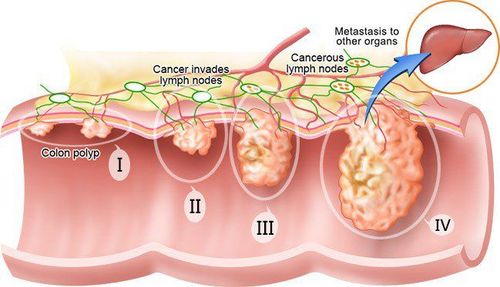This is an automatically translated article.
Post by Master, Doctor Mai Vien Phuong - Gastroenterologist - Department of Medical Examination & Internal Medicine - Vinmec Central Park International General Hospital.
Pain is a common cancer symptom. In fact, it is estimated that about 66% of people with cancer will experience pain as a symptom at some point. Cancer pain can have a number of causes, they can include the cancer itself or the effects of different treatments or surgeries.
1. Cancer and pain
All cancers have the potential to cause pain. The amount of cancer pain you may experience can depend on many different factors, including:
The type of cancer you have The stage of the cancer and whether or not it has spread or spread. cancer Your own pain tolerance Other health conditions such as comorbidities The cancer treatments you are being given. Young people are more likely to have cancer pain, and people with late-stage cancer tend to have severe pain.
When cancer itself causes pain, it is usually because the tumor presses on other organs, bones or nerves. Tumors can also spread to other areas, such as the spinal cord and bones, resulting in pain.
Trắc nghiệm: Thử hiểu biết của bạn về bệnh ung thư
Ung thư là nguyên nhân gây tử vong hàng thứ 2 trên thế giới. Thử sức cùng bài trắc nghiệm sau đây sẽ giúp bạn có thêm kiến thức về yếu tố nguy cơ cũng như cách phòng ngừa bệnh ung thư.
Bài dịch từ: webmd.com
2. Does cancer hurt? When you are diagnosed with cancer, there is not always a painful prognosis because it depends on the type and stage of the cancer. When you consider the possibility of pain associated with cancer, keep in mind. that all pain is treatable. Cancer-related pain is often caused by the cancer itself; painful treatment, such as surgery or comorbidities.
2.1. Pain caused by cancer itself Cancer causes pain due to:
Tumor compression: As the tumor grows, it can compress nearby nerves and organs, which in turn leads to pain. If a tumor has spread to the spine, it can cause pain by pressing on the nerves of the spinal cord. Metastasis: In the case of metastatic cancer it can cause pain in other areas of the body. Often, the metastasis of cancer to the bone is particularly painful. 2.2. Pain from cancer treatment Cancer surgery, treatment, and testing can all cause pain. Specifically:
Pain from surgery: For example, surgery to remove a tumor can lead to pain that can last for days or weeks. The pain will then subside over time, eventually disappearing. Pain as a side effect: Treatments such as radiation and chemotherapy can cause pain due to radiation burns, mouth sores, peripheral neuropathy Some cancer tests are invasive and potentially dangerous. pain for patients such as: lumbar puncture (removal of fluid from the spine), biopsy (removal of tissue), endoscopy (when a tube-shaped instrument is inserted into the body).

2.3. Comorbid pain is a condition in which two or more medical disorders are occurring in the same person. It is also known as multiple or multiple chronic diseases.
For example, if someone with throat cancer and neck arthritis (cervical spondylosis) feels pain, the pain may be due to arthritis, not cancer.
3. Patients should talk to their doctor when cancer causes pain When cancer causes constant pain, the patient needs to clearly communicate the pain to the treating doctor so they can provide a medicine suitable for the best pain relief and the fewest side effects.
The way for your doctor to determine the best treatment is through understanding your pain, such as acute, persistent or breakthrough pain.
For severe, acute pain that usually comes on quickly and doesn't last for a long time. Chronic pain: Chronic pain, also known as persistent pain, can range from mild to severe and can come on slowly or quickly. Pain lasting more than 3 months is considered chronic. Sudden pain: Unpredictable pain that can occur when you regularly take pain relievers for chronic pain. It usually comes on very quickly and can vary in intensity. Pain is a common symptom of cancer. It can be caused by the cancer itself, the methods used to treat the cancer, or by comorbidities. The pain depends on a number of factors, including the type of cancer you have and its stage. Tell your doctor if you have new pain that doesn't go away or pain that occurs even while you're taking your current pain medication.
Please dial HOTLINE for more information or register for an appointment HERE. Download MyVinmec app to make appointments faster and to manage your bookings easily.
References:Cervical spondylosis (arthritis of the neck). (2015). orthoinfo.aaos.org/en/diseases--conditions/cervical-spondylosis-arthritis-of-the-neck/ Comorbidity. (2012). drugabuse.gov/related-topics/comorbidity Facts about cancer pain. (2019). cancer.org/treatment/treatments-and-side-effects/physical-side-effects/pain/facts-about-cancer-pain.html














